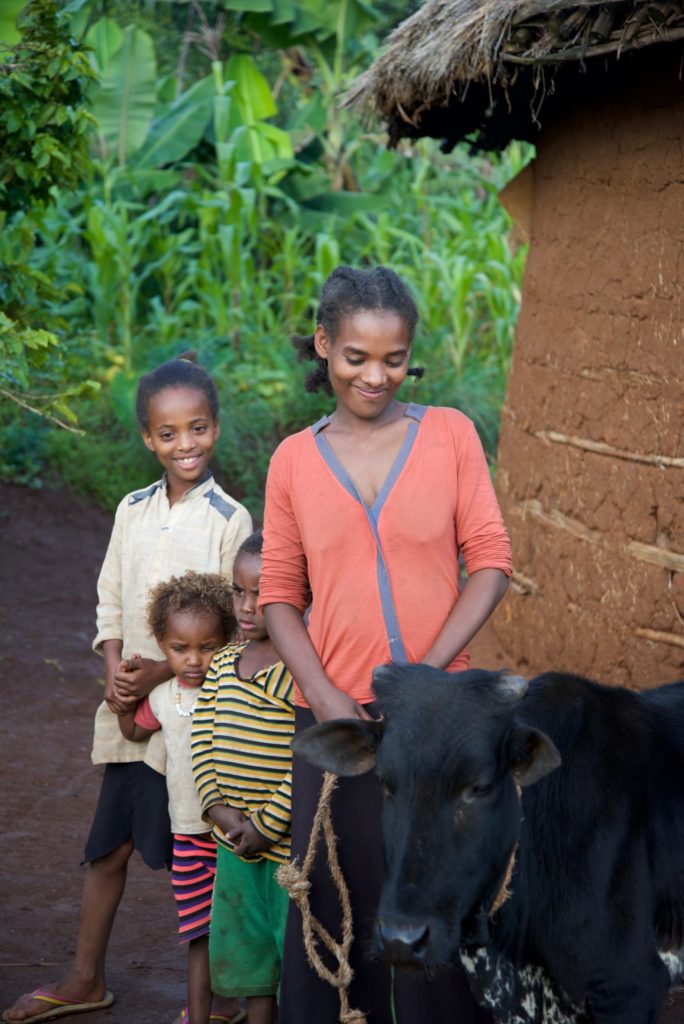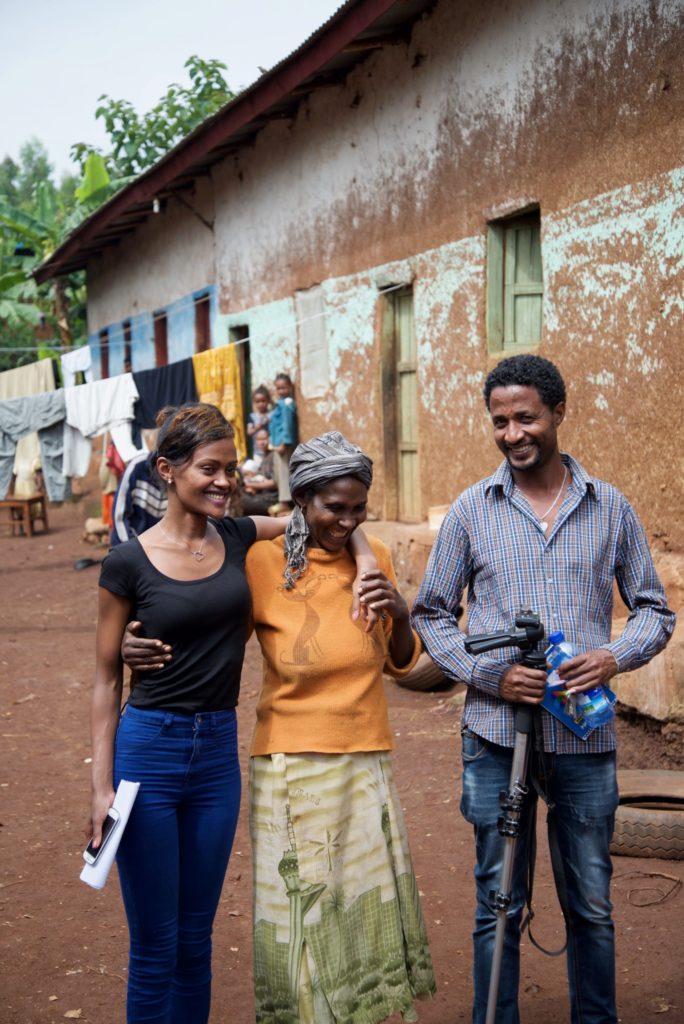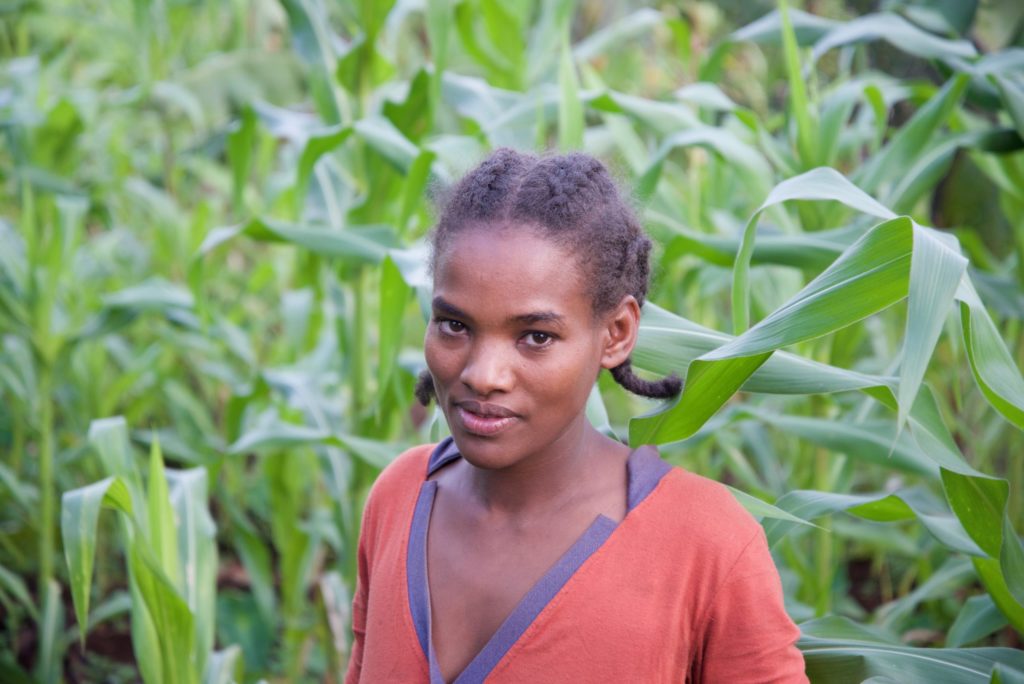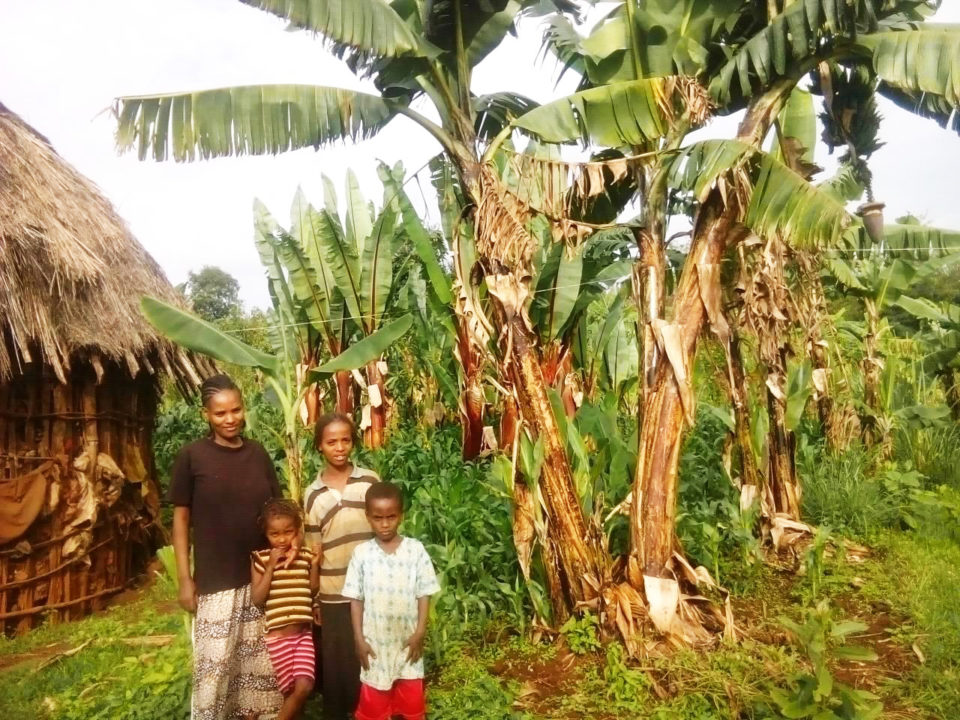When you give the gift of a cow, you can change a family’s life. In one impoverished community in rural Ethiopia, Holt donors have become like celebrities for all of the generous gifts of hope — especially cows — that they have given to so many families over the years. But as the story of one young mom shows, the greatest gift is often not the gift itself — but what it inspires in the hearts of those who receive it.

Meselech’s home is the smallest in her village.
A traditional, conical-shaped hut made of mud and eucalyptus branches, it’s the same style home as most families’ homes in her community. But the thatching on the roof has worn so thin that when it rains, Meselech and her children have to huddle to stay dry under the broad, droopy leaf of a “false banana” tree.
Meselech, her husband and her four children sleep inside this one-room home — some on elevated beds, others on the floor.
They are six people, living side by side in one room. But they are not alone.
In a fenced-off area, not far from where they sleep, a large, sinewy black heifer curls up at night on a bed of straw. It’s not healthy to share living space with farm animals. They attract insects that carry diseases like malaria, which Meselech’s husband is sick with when we visit.
But Meselech would never let her cow sleep outside. It could get sick. It could be stolen.
Meselech’s cow is her most valuable possession. It is her greatest gift of hope.

A Community Forever Changed by Gifts of Hope
Three years ago, Meselech could afford nothing for her children. Not food. Not medical care. Not clothing. Meselech’s children were often sick, and all of them were malnourished. Unable to afford school fees, uniforms and supplies, Meselech and her husband couldn’t even send their children to school. They had a small plot of land, but no money to grow food.
Where they live in southern Ethiopia, most people live in poverty. The kind of poverty where families often share living space with livestock — if they are fortunate enough to have livestock at all. The kind of poverty where children sleep on hard mud floors at night and then get up before dawn to walk six miles to school — if they go to school at all. The kind of poverty where children may have just one pair of clothing. Where women spend a good part of their day walking to get water. Where dinner may just mean cereal grains or bread. Where at night, when it gets dark, it stays dark.

But even here, in this deeply impoverished community, Meselech’s neighbors felt sorry for her and her children. They were the poorest of the poor.
“In Ethiopia, when you have nothing, you literally have nothing,” explained Gelila Yacob, Holt Ethiopia’s sponsorship coordinator.
“In Ethiopia, when you have nothing, you literally have nothing.”
Gelila Yacob, Holt Ethiopia sponsorship coordinator
Holt’s partner in Ethiopia is a local organization that started operation in 2008 — a year after Holt began serving children and families in Ethiopia. Called simply “OVC” — an acronym that stands for Orphaned and Vulnerable Children — the organization relies on Holt sponsors and donors to provide critically needed support to families in greatest need. They work in Shinshicho, a district capital in southern Ethiopia where goats and cattle still roam the unpaved roads that lead through town, few homes or businesses have electricity or running water, and donkeys are the primary mode of transportation.

Shinshicho was hard hit by the HIV epidemic in the 90s and early 2000s, and many families continue to struggle with the stigma and devastation of this chronic condition. Like most people in Ethiopia, the people of Shinshicho are also mostly subsistence farmers who live off what they can grow on their small plots of land. With such heavy reliance on agriculture in a region prone to drought and flooding, families are particularly vulnerable to any changes in weather patterns.
Through the years, many families in this village have lost their crops — often their entire livelihoods — to catastrophic droughts and floods, while many children have lost one or both parents to hunger or illness.
“When there’s a big drought, it floods easily — displacing people from their homes and affecting their crops,” Gelila explained as we walked from home to home through fields so muddy that the soles of our shoes built up a thick layer of what felt like cement.

We passed people working in their yards or heading to town along the dirt roads that meander through the village. Everyone was warm and welcoming to us. They know Gelila, who periodically makes the 3-hour trek from Addis to visit the nearly 70 families in Shinshicho who are supported by Holt sponsors and donors in the U.S. And they know the Holt and OVC social workers, all of whom live in Shinshicho and are well loved in this community for all that they do for so many families and children.

When they saw Mulunh, a social worker who has worked in this community for years, many people hugged him and kissed him on the cheek. “He’s like a senator,” Gelila said teasingly.

But they also recognized who we represent. One elderly woman stopped us in the road to kiss our hands. It’s not us, but the donors who we represent who they are thankful for.
They see how Holt donors have changed their community for the better.
When Holt began working in this community in 2008, we worked with local social workers to identify the families most in need of help — often families impacted by HIV and/or headed by a single mother. Holt donors gave these families the tools and resources they needed to regain their stability and begin growing their income to better support their children. For families living in the city without land, they provided low-interest microloans and training to help them start a small business. Once a family paid back their loan, the funds would be redistributed to another family in need — and any interest would go into a group savings program that they and other families could borrow from when they needed it.

“That way, we don’t need to work with them for a long time because they are self-sufficient,” explained Melese, the OVC coordinator who now works directly with each of the families.
For families that had land to cultivate, like Meselech and her family, donors provided livestock like a cow or chickens — often as a gift through Holt’s Gifts of Hope catalog. For these families, there truly is no better way to describe this gift than as a gift of hope. Cows are so valuable in Ethiopia, they are often the closest thing that families have to a savings account. One single mom we met was able to grow her income so much after she received a gift of a cow, she built a four-room house for her children to live in. She converted their old house — a traditional one-room hut — to a barn for their cow.
But at night, she still slept in the barn to protect their cow from thieves.

Thanks to Holt Donors
Meselech is strikingly pretty, and strikingly young. Like many young women in rural Ethiopia, Meselech dropped out of school when she got married in her teens. When we met her in the summer of 2016, she was 22 and had three children — a son and two daughters, her oldest with dark, neatly braided hair and a warm, inviting smile like her mom. Meselech’s younger daughter had curly, sun-lightened hair and a serious expression that seemed suspicious of the strangers in her home. Meselech seemed shy and not used to so much attention. She often directed her smile to the ground.
But when she made eye contact, she looked at you direct and clear. She well understood why we were there, asking personal questions and taking photos. Shy as she was, she took the opportunity to say how thankful she was to the people who we had traveled half the world on behalf of.
The people who helped her family when they had nothing. The people who gave her the then 9-month-old cow that she showed us — tightly holding its reins and smiling like a proud mom.

“I would like to give my thanks to Holt donors,” Meselech said, “and God bless them.”
“I would like to give my thanks to Holt donors, and God bless them.”
Meselech, a mother of three
When social workers at OVC learned about Meselech and her family, they immediately connected her with Holt donors in the U.S. Sponsors provided fees, books, school supplies and uniforms so that her children could go to school. A donor gave Meselech the gift of a cow. But it would take time for the cow to mature and begin producing milk that she could use to feed her children, or make cheese and yogurt to sell in the marketplace. In the meantime, they provided seeds to grow taro, a root plant like potato, beet root and enset, which she could use to make cereal and bread. Once the plants grew big enough, she could also use enset — locally known as “false banana” because its broad leaves resemble those of a banana tree — to feed her cow.

“I was not able to buy the seedlings or taro with my own money,” Meselech explained, as she showed us her growing crops. “Now, because of Holt and OVC, I am able to cultivate that so I have enough growings for the next three years.”
Inviting us inside her home, Meselech showed us piles of kollo ready to roast, as well as a couple handfuls of taro seeds ready to plant. “It seems like a very small amount,” she said. “But it can grow more beyond providing our food. We can sell it in the market.”
After one year of sponsors and donors supporting her family, Meselech and her husband had already starting earning enough to independently support their children.

“I used to do daily labor and I couldn’t support my children and send them to school,” she said. “After a year, I have been able to buy them educational materials, school uniforms and everything. Previously, I couldn’t send them to any kind of health centers or hospitals. Now, my children are able to get medical care. So whenever they feel sick, they can go in and be supported.”
Meselech and her husband had even begun to save beyond what they needed to provide for their three kids. They hoped to eventually build a new house next to their old one — so that they wouldn’t have to worry so much about flooding, or sleep next to their cow at night.
So that when it rained, their children wouldn’t have to huddle under a false banana leaf to stay dry.
A Gift of Hope, a Gift of Opportunity
Two years have passed since we visited Meselech at her home in Ethiopia, and our staff in Ethiopia recently sent an update on her progress. It’s nothing short of amazing. Meselech has become so successful, and her crops have grown so big, that she now employs four other women to help prepare her products to be sold in the market.
“Meselech … has been benefiting much from her petty trade by hiring four women on a daily basis who assist her in preparation and related activities,” our staff writes. “From her petty trading, she managed to make a profit of approximately 800 birr (about $29) per month. She also pays the workers’ daily wages, which was about 60 birr for each.”
With the profits from taro and kollo, Meselech also expanded her business — adding coffee and grains that she sells from her home, bringing in another 500 to 600 birr ($16-18) a month.

“She has a lot of customers who visit her home daily,” our staff writes.
She has diversified the food she grows on her land, adding vegetables, sugar cane and “real banana” in addition to the “false banana” trees that now grow jungle-like around her small home.
Six months ago, Meselech’s cow gave birth. And any time now, her cow will start producing milk. So much milk that Meselech can add nourishing, protein-rich dairy products to her children’s diet. So much milk that she can sell any leftover in the market, and may need to hire more employees to help her make yogurt and cheese.

So much milk that she and her husband can hopefully, finally, build the new house they have dreamed of building. A house made of wood with a corrugated tin roof that will keep their children warm and dry throughout the rainy season. In Ethiopia, the price of nails and tin is too expensive to buy right now, but they are saving — and hoping the price will come down.
In just a few short years in our program, Meselech has succeeded beyond all expectation. She recently had another child, who she supports in addition to her three other children. She is fully independent and no longer relies on support from Holt sponsors and donors. She is a successful business owner providing jobs and reinvesting in her community.
And she is not yet done.

Just last month, at the start of the Ethiopian new year, Meselech went back to school right alongside her kids. She is determined to finish her education.
Through their kindness and generosity, sponsors and donors gave Meselech and her family the gift of hope — and opportunity.
But they didn’t save her. They empowered her to save herself.

Give a Gift of Hope
Give a lifesaving or life-changing tangible gift to a child or family in need. And this holiday season, give in honor of a loved one and they’ll receive a free card!




